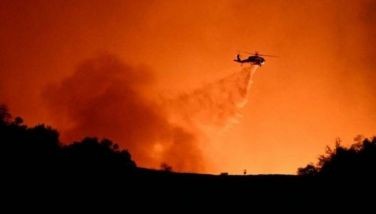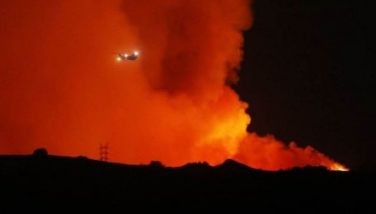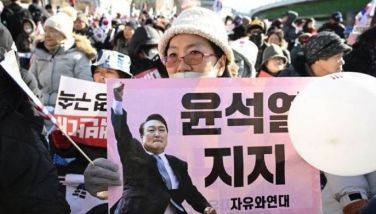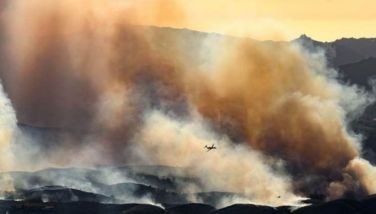Spain moves to extend state of emergency as virus deaths soar
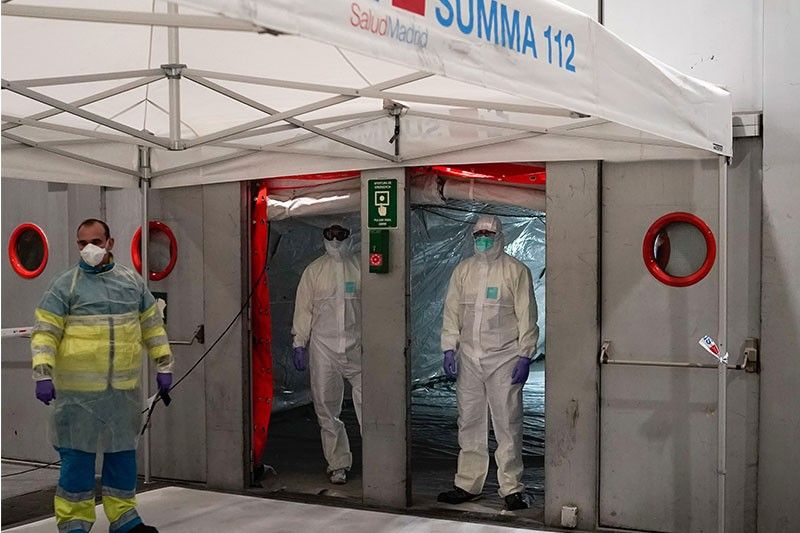
MADRID, Spain — Spain's prime minister said Sunday he would ask parliament to extend a state of emergency until April 11 to try to curb the spread of coronavirus after the country recorded 394 new deaths from the disease.
A nationwide 15-day state of emergency was first announced on March 14 barring people from leaving home except for essential outings such as buying food or seeking medical care.
Sanchez said his cabinet would on Tuesday approve the request to extend the state of emergency for another 15 days, adding he was confident that the assembly would approve it.
"I know it is a drastic measure...but experts agree that it is an effective measure in the fight against coronavirus," he told a news conference after holding talks via video conference with the heads of Spain's regional governments.
The announcement comes after Spain reported 394 new deaths caused by the pandemic, raising to 1,720 the official death toll in Europe's worst-hit country after Italy, a 30 percent increase over the previous day.
The number of confirmed cases of the disease rose by 3,646, or 14.6 percent, to 28,572. Sanchez warned the outbreak would continue to expand in the coming days.
"We have yet to receive the impact of the strongest, most damaging wave, which will test our material and moral capacities to the limit, as well as our spirit as a society," he said during a televised address late on Saturday.
'Signficant problem'
The rise in infections is bringing the health care system in this nation of around 46 million people to the brink of collapse.
The hospitals are particularly stretched in the regions of Madrid and Barcelona, which account of half of all officially recorded infections of COVID-19.
"There will be stress and a problem in some places. The pressure on the system will be high," the health ministry's emergencies coordinator, Fernando Simon, said.
"This collapse which is being talked about could happen in some places but it will not be generalised."
Health care workers have for days complained that they are running short of equipment, such as masks.
The pandemic claimed the first life of a health care worker in Spain last week: a 52-year-old nurse in the Basque Country, northeast Spain.
Doctors, nurses and other health care workers accounted for over 10 percent of all confirmed cases of coronavirus, Simon said.
"This is a significant problem for our health care system," he told journalists.
To ease pressure on hospitals in the Madrid region, soldiers helped move patients to a makeshift field hospital over the weekend set up at a conference centre in the Spanish capital.
The facility will be fitted with 5,500 hospital beds, which would make it the biggest such coronavirus field hospital in Europe.
About 1,300 hospitals beds have so far been set up at the facility and officials plan to move over 300 patients there this weekend, the director of the field hospital, Antonio Zapatero, said in an interview with daily newspaper El Mundo.
A photo taken before the first patients arrived showed rows of empty beds covered in white sheets laid out on the concrete floor of the conference centre.
More masks
The Spanish government said Saturday it would distribute another 500,000 masks to healthcare workers, and 800,000 for patients.
It also said it had also bought more than 640,000 coronavirus tests.
Authorities have called up 52,000 extra workers to help the country's health service as it struggles to contain the virus, including 14,000 retired doctors and nurses.
Around 2,850 soldiers have been mobilised to disinfect airports and ports, and transport patients to less crowded hospitals.
Police said they were stepping up their reinforcing on the restrictions on movement.
Spain's national police force tweeted a video of two officers on horseback chasing a man riding his bicycle in Madrid along with the warning that it would continue to crack down against the "irresponsible minority" that did not follow the rules.
"We know what the stakes are," said the deputy head of the force, Jose Angel Gonzalez. "This week will be crucial."
Follow this page for updates on a mysterious pneumonia outbreak that has struck dozens of people in China.
New Zealand Prime Minister Chris Hipkins says on Sunday that he had contracted COVID-19, testing positive at a key point in his flailing campaign for re-election.
Hipkins saYS on his official social media feed that he would need to isolate for up to five days -- less than two weeks before his country's general election.
The leader of the centre-left Labour Party said he started to experience cold symptoms on Saturday and had cancelled most of his weekend engagements. — AFP
The World Health Organization and US health authorities say Friday they are closely monitoring a new variant of COVID-19, although the potential impact of BA.2.86 is currently unknown.
The WHO classified the new variant as one under surveillance "due to the large number (more than 30) of spike gene mutations it carries", it wrote in a bulletin about the pandemic late Thursday.
So far, the variant has only been detected in Israel, Denmark and the United States. — AFP
The World Health Organization says on Friday that the number of new COVID-19 cases reported worldwide rose by 80% in the last month, days after designating a new "variant of interest".
The WHO declared in May that Covid is no longer a global health emergency, but has warned that the virus will continue to circulate and mutate, causing occasional spikes in infections, hospitalisations and deaths.
In its weekly update, the UN agency said that nations reported nearly 1.5 million new cases from July 10 to August 6, an 80% increase compared to the previous 28 days. — AFP
The head of US intelligence says that there was no evidence that the COVID-19 virus was created in the Chinese government's Wuhan research lab.
In a declassified report, the Office of the Director of National Intelligence (ODNI) says they had no information backing recent claims that three scientists at the lab were some of the very first infected with COVID-19 and may have created the virus themselves.
Drawing on intelligence collected by various member agencies of the US intelligence community (IC), the ODNI report says some scientists at the Wuhan lab had done genetic engineering of coronaviruses similar to COVID-19. — AFP
Boris Johnson deliberately misled MPs over Covid lockdown-breaking parties in Downing Street when he was prime minister, a UK parliament committee ruled on Thursday.
The cross-party Privileges Committee said Johnson, 58, would have been suspended as an MP for 90 days for "repeated contempts (of parliament) and for seeking to undermine the parliamentary process".
But he avoided any formal sanction by his peers in the House of Commons by resigning as an MP last week.
In his resignation statement last Friday, Johnson pre-empted publication of the committee's conclusions, claiming a political stitch-up, even though the body has a majority from his own party.
He was unrepentant again on Thursday, accusing the committee of being "anti-democratic... to bring about what is intended to be the final knife-thrust in a protracted political assassination".
Calling it "beneath contempt", he said it was "for the people of this to decide who sits in parliament, not Harriet Harman", the veteran opposition Labour MP who chaired the seven-person committee. — AFP
- Latest
- Trending
















